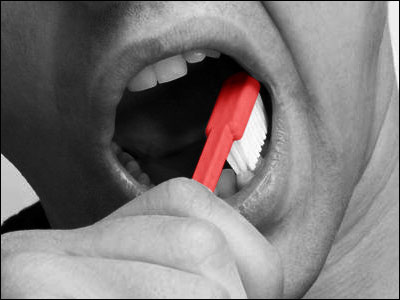This morning someone asked me,
“How do I stay motivated to exercise? I used to exercise regularly, but now every time I start again I get bored after a few days and stop. I want to look better and be healthier but just can’t stay motivated to work out. What should I do?”
I’m going to borrow an analogy from Ken Hutchins and replace the words “exercise” and “work out” in their question with “brush my teeth” and I want you to read it a few times and think about how it sounds:
“How do I stay motivated to brush my teeth? I used to brush my teeth regularly, but now every time I start again I get bored after a few days and stop. I want to look better and be healthier but just can’t stay motivated to brush my teeth.”

When we were children our parents taught us to brush and floss our teeth regularly because it is necessary to maintain the health and appearance of our teeth. We don’t stop brushing our teeth because it isn’t fun or entertaining because that would be irresponsible. Proper exercise is no different.
We should exercise regularly because it is necessary to maintain the long-term health and appearance of the rest of our body. We shouldn’t need any other motivation to exercise any more than we need it to brush our teeth, wash our hands, bathe, eat a nutritious diet, get enough sleep, or any of the other things necessary for good health. Whether you enjoy exercise or not is irrelevant (and if you do you’re probably doing it wrong); it is something you must do if you want to be as fit and healthy as possible, for as long as possible.
If you don’t exercise properly you are nowhere near as strong, enduring, and tough as you have the potential to be. As a result there are a lot of physical tasks you should be able to perform that you can’t, you aren’t as good at the ones you can perform, and you are more vulnerable to injury while performing them. At best your lack of strength and endurance prevents or limits your ability to participate in and enjoy many physical activities and reduces your helpfulness to others, at worst it can mean the difference between life and death for you and/or others in an emergency. How’s that for motivation?
All else being equal, someone who exercises properly will have better body composition and shape and be more physically attractive. While looks certainly aren’t everything they strongly affect how we are perceived and treated by others. Because of this, when we look better we also feel better about ourselves and are more confident in our interactions with people. Like it or not, your physical appearance can have a tremendous impact on your personal and professional relationships and long term happiness, and without proper exercise you will not look your best. How’s that for motivation?
Many of the health problems associated with aging are due to the loss of muscle mass over time, called sarcopenia. Losing muscle negatively affects your basal metabolic rate, cardiovascular health, bone density, insulin sensitivity, body temperature regulation, balance, and more. Eventually, continued loss of strength can rob you of your ability to perform even the most basic activities of daily living and your independence. If you exercise properly you will have more muscle to begin with, and keep it longer, significantly reducing your risk of these problems and maintaining your functional ability and independence much longer, if not your entire life. There is even some evidence proper exercise can reverse some effects of aging. How’s that for motivation?
Some of you may be thinking, “Yeah, but exercise takes a lot more time, effort, and money than brushing my teeth”. So what? You know what else takes a lot of time and effort? Trying to perform many of the activities of daily living most people take for granted when you are old and weak because you failed to exercise. You know what else costs a lot of money? Treatment for all the medical conditions you’re more likely to suffer if you fail to exercise.
Contrary to uninformed opinion you do not need to spend a lot of time working out for good results. If you are exercising properly the most you need is two or three half-hour workouts per week, and if you really are pressed for time you can get pretty good results with just one. Although there are advantages to having a good home gym or gym membership, if cost is an issue you can train safely and effectively at home without any equipment using bodyweight and isometric exercises. Even if you have significant physical limitations if you can voluntarily contract your muscles there are ways for you to exercise safely and effectively.
So, if you’re looking for motivation to exercise despite not finding it fun or exciting, think about it the same way you do brushing your teeth. If you don’t brush them you’re going to have unhealthy and unattractive teeth and they’re going to fall out. If you don’t exercise you’re going to have an unhealthy, unfit, unattractive body that isn’t capable of a fraction of what it should be.

Comments on this entry are closed.
Thank you for this!
There’s a video I watched recently called “Motivation is Bulls@#%” (https://www.youtube.com/watch?v=yKL16qr5ti4) that was really helpful for me to get started and also to remain consistent. Also helpful was a change in mindset from “I need to” or “I shouldn’t” to “I DO” or “I DON’T.” Specificity also is needed.
Example: I should strength train twice per week becomes I DO strength train as prescribed by Project Kratos on Mondays and Fridays. I shouldn’t eat crap becomes I DON’T eat anything out of a box, with added sugar, or with artificial sweeteners. Mindset was a huge game changer for me, and part of that came from your blog. I love the analogy in this article! Thanks again for all you do.
Hey Mandy,
These are all good points. I will check out that video when I have time. Thank you!
I really enjoyed this article, thanks. I know so many people who need to read this.
I love this. I’ve been exposed to your ideas about exercise for a long time, but even so, this was such a great, refreshing, and concise explanation of a very central and crucial one of them. Thanks for writing it.
Along the lines of this same idea, what are your thoughts about using “fake foods” as a way to maintain a healthy diet? What I mean by “fake foods” are things that are actually in keeping with a person’s diet, but that are meant to be like things that aren’t (for example, fake meat products for vegetarians, or low-carb ‘baked’ goods for people on paleo-type diets, or even a lot of the protein bars out there that are healthy, but are intentionally designed to taste like cookie dough, or a candy bar, or whatever). To me this seems like the equivalent of using music, or dance, or something like that, as motivation to exercise. It’s counter-productive and untenable, in my opinion, because it still hasn’t dealt with the root cause of motivation problems: the idea that doing the rational thing is somehow an imposition and sacrifice.
Hey Phil,
Fake meat isn’t a substitute for actual meat, and there is absolutely nothing objectively unethical about eating meat any way. Most protein bars are crap. They’re usually made with cheap ingredients and low quality proteins like soy and are a very poor substitute for real food. If someone is trying to follow a low-carb diet and wants some baked goods made with lower-carb items there is no problem with it, although for most people there is no real benefit to reducing carbs other than it being just another way to reduce calorie intake.